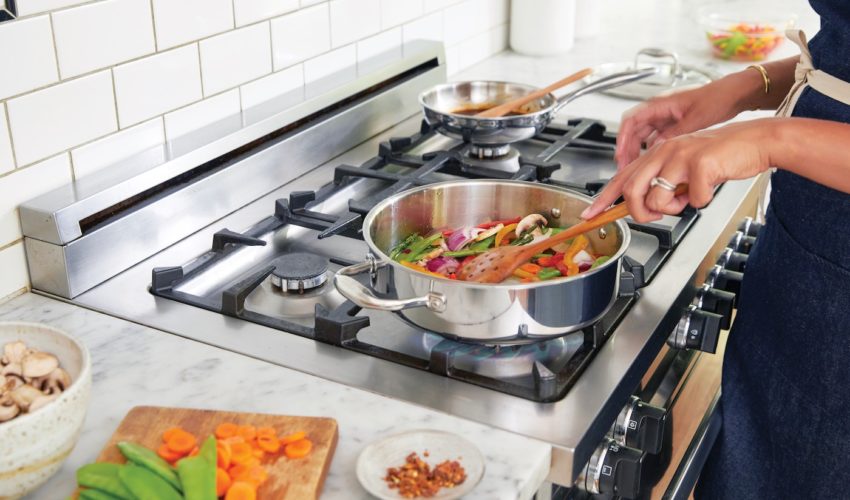Whether you’re considering a simple appliance upgrade or a major renovation to your home, the choice between gas and electric appliances is often determined by which systems already exist in the house. However, many homeowners have been choosing to convert their appliances from electric to natural gas to reap the benefits of this source of energy.
Why Gas is Better than Electric
First, let’s start with the bottom line: your budget. According to Consumer Affairs, natural gas is almost always going to cost less than electricity and homeowners can save up to 30 percent on utility bills by switching from electricity to gas. Upgrading from electric appliances to gas-fueled may cost a bit more upfront; however, the reduced utility bills should offset that cost in the long run.
Cooking
Now let’s take a look at the experience of using gas. When cooking, most top chefs far prefer cooking over a gas flame rather than an electric burner. Not only will a gas flame heat both stovetop pans and ovens faster, but adjusting the heat is also easier. Electric coils take longer to warm up, and they hold their heat for longer. That means if your temperature is too high, your food may be burned before an electric coil cools off. Gas ovens also offer a more moist heat so roasting and baking produce better results over the dry conditions of an electric model.
Washing & Drying
Hot water is another household necessity, and gas water heaters fare better in the long run than their electric counterparts. If you have a busy family, an electric water heater takes much longer to recover so you’ll have to space your showers accordingly. Plus, if the power goes out, your electric water heater will sit idly until power is restored. Gas clothes dryers also benefit from the same fast-heating features provided by gas which means your clothes dry faster and use less fuel to do so. Plus, because the heat dissipates more quickly, clothes tend to be less wrinkled so you won’t have to fuss with an iron as often.
Heating Your Home
Heating our homes and keeping them comfortable can consume the most overall energy in the average home. Choosing whether to use a gas or electric furnace is a big decision, and many factors should be considered. First is the cost of fuel, and we already know that gas tends to be cheaper than electricity making gas furnaces the top choice for households that require a lot of heating. Gas furnaces also tend to be more energy efficient so the Earth benefits from them as well.
Electric furnaces tend to be less expensive to purchase and a bit easier to install, and some experts consider them to be a bit safer than gas. However, current safety standards are very stringent so unless your gas furnace is a dinosaur, it’s likely to be very safe to operate in any household.
Making the Switch
If your home is powered only by electricity, the hurdle may be significant to achieve gas-powered appliances. If gas service is already present in the home, the project becomes significantly more accessible and affordable. If your home already has at least one gas appliance, then switching others from electric to gas is likely to be the most straightforward task.
Estimating the cost of making the change is difficult as it varies widely depending on the existing services in your home. Plus, only a master plumber should be installing, replacing, and adding gas lines to any home and that level of expertise and experience isn’t cheap. Keep in mind that your city, county, or other local governing body is likely to require a permit and inspection for work done on gas lines, and these can cost a few hundred dollars as well.
What You Should Know
When considering making the switch from gas to electric, there are a few more points to keep in mind. First, if you have no gas service to your home already, the utility will have to be involved to install a gas meter and possibly perform inspections. Second, there are safety concerns to address as gas poses a different set of risks than electricity. For example, carbon monoxide detectors will become a must in the household, and any kind of gas leak—no matter how small—will need to be corrected immediately as inhaling natural gas directly can be toxic to people and pets. Lastly, gas lines need to be adequately sized and pressurized for the best experience as low-pressure lines can cause appliances to compete, similar to how the shower pressure may momentarily decrease when a toilet is flushed.
The Verdict: Gas vs. Electric
Using gas appliances comes with many benefits, but making the switch is a significant project that shouldn’t be taken lightly. For an existing home, the cost and difficulty of making the switch depends heavily on the services that already exist. Still, for those that already have at least one gas appliance, it may be fairly easy to make the conversion. In every case, however, only a qualified professional should add or change your natural gas configuration, and the experts at North East are up to the challenge!


